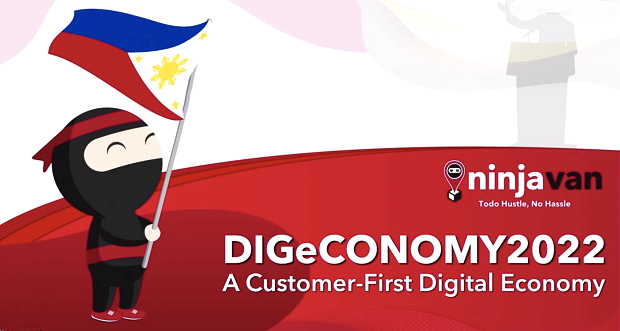According to a 2021 report by consultancy firm AlphaBeta, the Philippine digital economy can generate P5 trillion by 2030. This thriving digital economy, however, will only emerge if businesses leverage digital transformation.

Unfortunately, not all Filipinos find it easy to use — or even access — digital technology. The 2021 e-Conomy Southeast Asia 2021 Report indicated that the Philippines is lagging behind the rest of the region with only 68 percent of its Internet users transacting online.
To assist the country’s micro, small, and medium enterprises (MSMEs) in maximizing digital transformation, tech-powered logistics firm Ninja Van recently held its first DIGIeCONOMY Summit where it brought together experts from the private and public sector to discuss the challenges hindering Filipino MSMEs’ digital transformation and offer advice to MSME business owners.
“The main reason that we decided to organize an event like this was really to provide a platform for the community to engage with each other. From the business stand point, as well as from our MSMEs, and from again our very notable regulators, [we will] share information and understand what direction are economy is moving in and how we can drive this together,” Martin Cu, Ninja Van Philippines country head, declared as he opened the event.
The experts started by confronting the obstacles hindering MSMEs’ digital transformation, namely the country’s digital infrastructure and Filipino’s digital capabilities.
The Philippines’ lacking digital infrastructure, particularly the low high-speed broadband penetration and the lack of equitable internet services in rural areas, is holding back the country’s digitization, they said.
Pierre Tito Galla, Democracy.net.ph co-founder and co-convenor, stressed that legislative action is needed to hasten infrastructure improvement.
“We need to pass a law called Open Access in Data Transmission so that we further open the Philippine digital market and grow the Philippine ICT system. We need a Rural Wired Connectivity Development Act so that we will ensure the penetration into the rural last mile. We need to pass the Spectrum Management Act so that we will be able to grow wireless services,” he said.
Speaking for the public sector, Department of Information and Communications Technology (DICT) assistant secretary Alvin Navarro said the government is working at a “feverish pace to build and expand the country’s digital infrastructure.”
Besides having access to an equitable digital infrastructure, MSME owners need to be armed with the mindsets and digital skills necessary to thrive in the digital space, the experts said.
During her talk, GoNegosyo executive director Thermina Akram emphasized that smaller businesses tend to resist digitalization because they are intimidated by the technologies that enable e-commerce such as logistics apps and e-wallets.
“What we’re doing in GoNegosyo is helping them have that shift in mindset that there is no other way or no other time to do it but now. Slowly, [we] are assisting them in having that shift in mindset by providing them with capacity-building sessions [and] support programs that eventually teach them how to adjust from the usual face-to-face selling into e-commerce,” Akram said.
If business owners are looking for training, they can also approach the government for assistance, according to Blesila Lantayona, Department of Trade and Industry (DTI) undersecretary, who said the agency’s capacity-building programs for the business owners are ready to bring them into the digital space.
Lantayona said DTI’s Jobs Training Pathway is a program where entrepreneurs can learn about e-commerce, e-payment, and digital marketing. There have been over 200 sessions under this program attended by over 42,000 participants, she said, adding that DTI’s Negosyo Center portal also aims to support digital transition among entrepreneurs.
Similarly, the DTI Philippines Trade Training Center (DTI PTTC) also offers trainings tailored to specific industries spanning from food to export as well as certain skills like marketing and labelling, packaging, and prototyping.
The experts also advised business owners to be customer-centric. Winsley Bangit, chief customer officer of GCash, urged attendees to focus on pain points.
“If you make things easy and convenient for individuals, for families, and for communities, then I believe we can move towards a more successful and connected Philippines,” Bangit said.
Vin Perez, Ninja Van Philippines chief operating officer, pressed home the point: “Customer-centricity needs to be front and center now as we grow the digital economy. In order to build trust, we have to be able to resolve the concerns of our consumers. Making them happy and trusting is a big part of how we can drive forward this digital ecosystem.”




